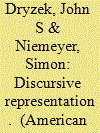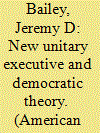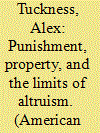| Srl | Item |
| 1 |
ID:
085454


|
|
|
| 2 |
ID:
085458


|
|
|
|
|
| Publication |
2008.
|
| Summary/Abstract |
What shapes politicians' strategies in political systems where pork, rather than programmatic platforms, wins elections? We argue that resource control provides much of the answer, as politics in pork-centric systems will in large part be organized around actors who control access to pork. We use new national and subnational data from Brazil and Japan to show how the degree of centralization of resources can affect party affiliation patterns. We find that in decentralized Brazil, both national and subnational politicians join parties that control their subnational government. In contrast, in our analysis of centralized Japan, politicians at both national and subnational levels base their party affiliation decisions on national-level partisan considerations.
|
|
|
|
|
|
|
|
|
|
|
|
|
|
|
|
| 3 |
ID:
085450


|
|
|
|
|
| Publication |
2008.
|
| Summary/Abstract |
The actual impact of judicial decisions often depends on the behavior of executive and legislative bodies that implement the rulings. Consequently, when a court hears a case involving the interests of those controlling the executive and legislative institutions, those interests can threaten to obstruct the court's intended outcome. In this paper, we evaluate whether and to what extent such constraints shape judicial rulings. Specifically, we examine how threats of noncompliance and legislative override influence decisions by the European Court of Justice (ECJ). Based on a statistical analysis of a novel dataset of ECJ rulings, we find that the preferences of member-state governments-whose interests are central to threats of noncompliance and override-have a systematic and substantively important impact on ECJ decisions
|
|
|
|
|
|
|
|
|
|
|
|
|
|
|
|
| 4 |
ID:
085451


|
|
|
|
|
| Publication |
2008.
|
| Summary/Abstract |
Central to the recent argument from the "unitary executive" is the claim that the unitary executive is consistent with the text and history of the Constitution. But because this veracity and importance of this claim is contested, unitarians also argue that the unitary executive is consistent with democratic theory. This article examines that argument by addressing a question in the political thought of Alexander Hamilton. Although Hamilton was an important defender of an energetic executive, and is associated with an expansive interpretation of executive power, he wrote in The Federalist that the president and Senate would share the removal power. In contrast with existing scholarship, which either overlooks Hamilton's statement on removals or dismisses it as a careless error, this article argues that Hamilton's statement limiting presidential removals illuminates his larger argument about executive energy. By showing how "duration" would check "unity," this article clarifies Hamilton's political thought and offers an important critique of the modern argument from the unitary executive
|
|
|
|
|
|
|
|
|
|
|
|
|
|
|
|
| 5 |
ID:
059285


|
|
|
| 6 |
ID:
085453


|
|
|
|
|
| Publication |
2008.
|
| Summary/Abstract |
The standard interpretation of Locke assumes symmetry between punishment by individuals in the state of nature and punishment by states in the state of nature. The standard interpretation is incorrect because in cases where the punishment is altruistic, the state is not the functional equivalent of a person, having a more restricted power to punish. The asymmetry arises from Locke's contractualism because individuals in the state of nature might reasonably refuse to give governments the power to punish altruistically. This interpretation clarifies some ongoing puzzles about Locke's theory of property where questions about coerced sacrifices to benefit others also arise. Locke's argument is vulnerable to important objections, specifically that he equivocates on the meaning of the word "body," that he places too much emphasis on the right of self-preservation, and that he legitimates nearly unlimited appropriation by states.
|
|
|
|
|
|
|
|
|
|
|
|
|
|
|
|
| 7 |
ID:
085456


|
|
|
|
|
| Publication |
2008.
|
| Summary/Abstract |
This study considers whether and to what extent defections from a government coalition are punished. The study employs data on coalitions in eastern and Western Europe from 1950 through
2006. The results show that if a coalition breaks due to conflict between partners or if one party withdraws from it, subsequent inclusion of the conflicting parties in the same coalition becomes less likely. Additional tests demonstrate that this effect occurs because defectors are punished by their former Coalition partners. Another extension of the main analysis shows that rather than becoming pariah parties, defectors lose credibility only in the eyes of their former coalition partners.
|
|
|
|
|
|
|
|
|
|
|
|
|
|
|
|